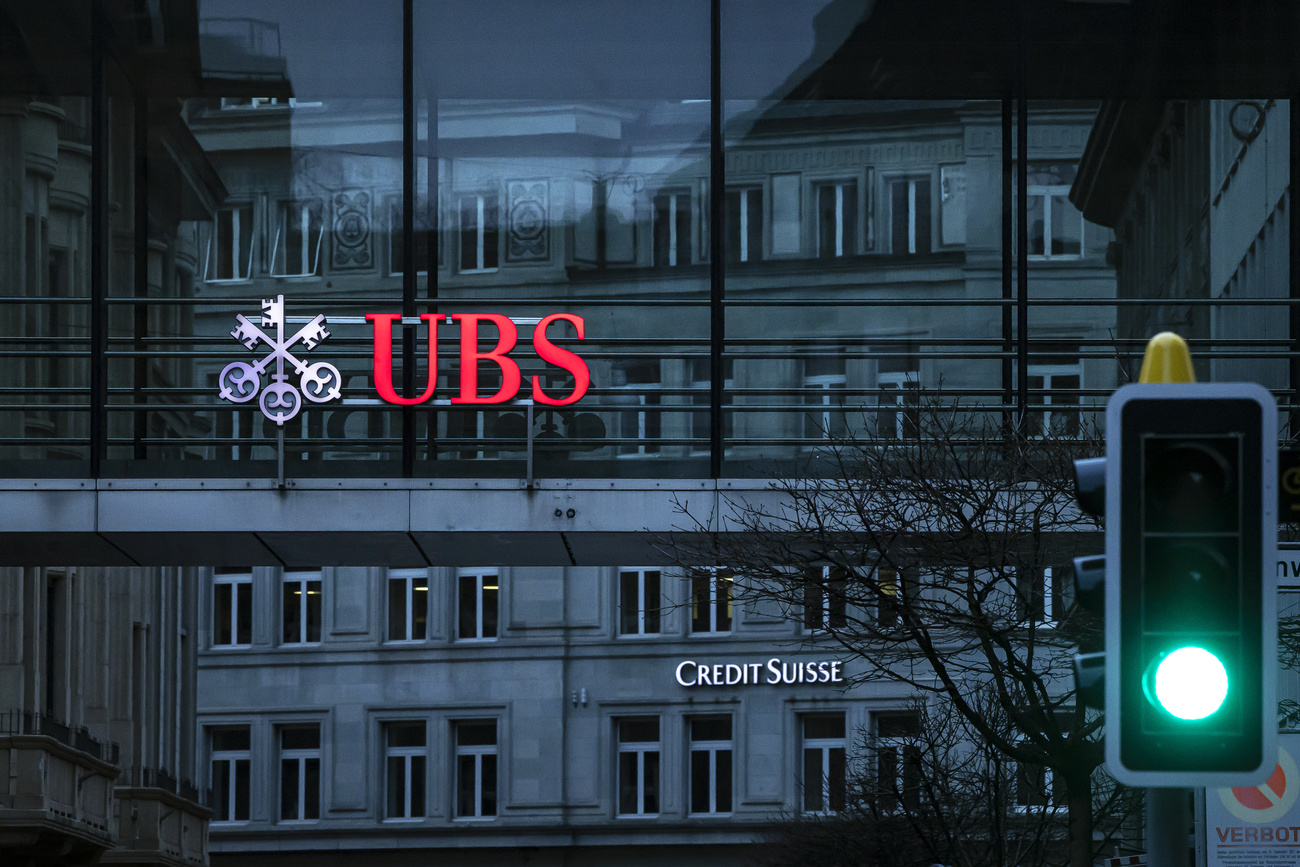Credit Suisse collapse: consequences and open questions

Swiss banks are supposed to be conservative, reliable safe havens during turbulent times. The emergency takeover of Credit Suisse by UBS has shattered this image and damaged the credibility of the Swiss banking sector.
SWI swissinfo.ch analyses the consequences and open questions surrounding the dramatic rescue of a ‘too big to fail’ bank.
Global effects
The reverberations of this seismic bank failure will also be felt around the world.
The takeover resulted in CHF16 billion ($17 billion) of Credit Suisse-issued bonds being written off as worthless. This act “will have a long-term consequence for any Swiss financial debt,” one unnamed Credit Suisse bond holder told the Financial Times.
In other words, investors might now think twice before putting their money into Swiss corporate bonds in future.
+ How the Credit Suisse takeover unfolded over a weekend of mayhem
The Swiss government also forced through the Credit Suisse takeover without a shareholder vote. To put it mildly, this circumvented the law and dented property rights in Switzerland.
Switzerland has a reputation for cast iron legal certainty, stable governance and clear divisions between the political and business worlds.
Even before the takeover, Credit Suisse was facing lawsuits in the United States from people complaining they had been deceived by the bank.
The Saudi National Bank and the Qatar Investment Authority have been ominously quiet after being sidelined during the UBS takeover.
Credit Suisse shares were trading at around CHF4 when the Middle East investors poured in their billions. The takeover deal priced their shares at CHF0.76.
“From now on, investors in Switzerland can expect to be expropriated without a legal basis,” Swiss law professor Peter V Kunz told the Tamedia news group. “Lawsuits will arrive.”
Picking up the pieces
It’s one thing to announce a huge corporate takeover, it’s another matter to pull it off successfully – particularly when the takeover target was already on its knees.
“This is a commercial solution, not a bailout,” says Swiss Finance Minister Karin Keller-Sutter.
But the Swiss taxpayer is on the hook for CHF9 billion should things go wrong. The Swiss National Bank is committed to printing up to CHF100 billion to make sure the fused bank has enough funding for day-to-day operations.
+ Where did it all go wrong for Credit Suisse?
UBS chair Colm Kelleher said the takeover “reinforces Switzerland as a leading global financial centre”. He added that the deal presents “enormous opportunities” and that “UBS will remain rock solid.”
This will be achieved by sweeping out toxic assets at Credit Suisse’s investment banking division to “align it with our conservative risk culture”.
The CHF9 billion of state backing would come into play to share the burden of potential losses incurred during this exercise.
More
On an operational front, UBS faces the task of fitting together the retail and investment banking, wealth and asset management units of two huge banks. It has had no time to prepare for such a daunting exercise.
Kelleher and current UBS CEO Ralph Hamers will take charge of the combined entity, which will essentially be a larger version of UBS.
UBS employs 72,600 staff worldwide. But Credit Suisse’s 50,000 employees, including 16,000 in Switzerland, face the greater uncertainty about their jobs.
Trade unions have demanded an action plan from the authorities to ease the pain of the inevitable redundancies.
The Swiss authorities have offered assurances that Credit Suisse will be dismantled in orderly fashion – and that the Swiss banking system is safe. But these assurances have yet to be realised in practice.
How did this happen?
After the 2008 financial crisis, such a dramatic banking collapse was not supposed to happen again.
Banks around the world have since been forced to stock up their reserves to absorb market shocks. Switzerland applied an even tougher “Swiss Finish” version of these rules.
These regulations clearly failed to prevent the collapse of Credit Suisse. The fusion of Switzerland’s second largest bank with UBS has now created a behemoth that is ‘even more too big to fail’.
The combined balance sheet of both banks stands at over CHF1.6 trillion compared to Switzerland’s CHF800 billion gross domestic product (GDP).
The finger of blame for Credit Suisse’s demise has been pointed at a succession of bad managers and a culture of greed at the bank.
Even though the bank technically had enough funds to continue operating, the catalogue of errors and scandals over the years eventually destroyed market confidence in the brand.
“They bungled, took risks they couldn’t control and made insane amounts of money doing it,” Swiss Trade Union Confederation chief economist Daniel Lampart told Swiss public television SRF just before the takeover.
Left-leaning political parties in Switzerland are leading the charge for further reforms of the banking sector.

More
Bank it
Proposals include giving the financial regulator more funding and the ability to impose fines on miscreant banks.
There are also more draconian demands to bring bank executives to court and throw them in jail if they flagrantly break the rules.
Switzerland’s image
In the final analysis, 167 years of Credit Suisse history was brought to a shuddering stop during a weekend of frantic negotiations to engineer a last-gasp rescue package.
Switzerland has lost one of its iconic corporate brands, created in 1856 by celebrated business leader Alfred Escher to fund a golden period of industrial growth.
The shock is similar to the collapse of the Swissair national airline in 2001 – although perhaps fewer people will look back on Credit Suisse with such nostalgia.
The Swiss authorities were forced to rescue UBS in 2008, but this was just one of many international banks on the verge of collapse during a global banking crisis.
Credit Suisse was sent into its final death throes by the collapse of two banks in the United States, although neither US entities were as large or as important as Credit Suisse.
On this occasion, Switzerland stands alone at having caused major ructions to the global financial system.

In compliance with the JTI standards
More: SWI swissinfo.ch certified by the Journalism Trust Initiative





















You can find an overview of ongoing debates with our journalists here . Please join us!
If you want to start a conversation about a topic raised in this article or want to report factual errors, email us at english@swissinfo.ch.